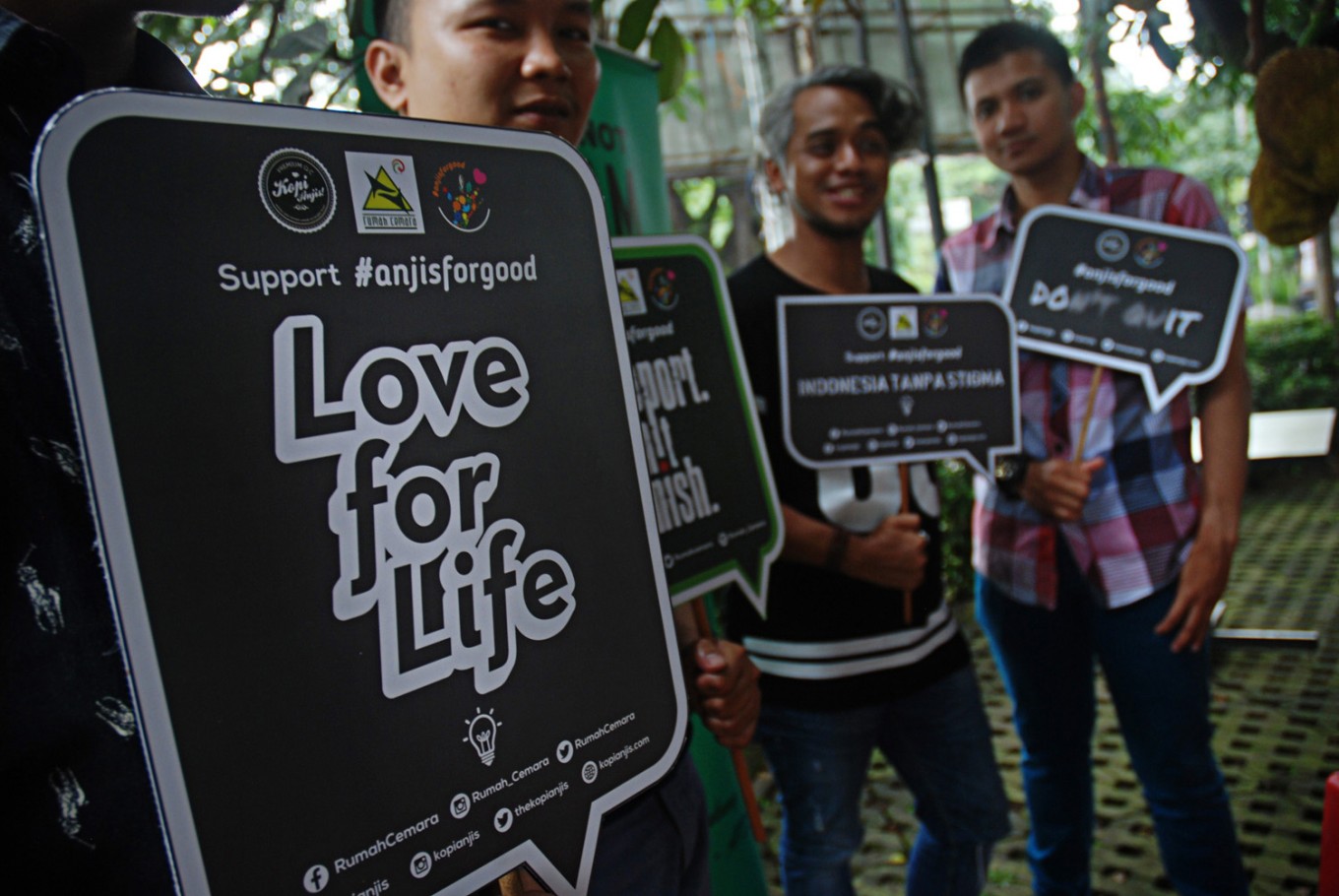Cheaper Hepatitis C drugs still too costly for most patients
Baby Rivona, a 48-year-old single mother who lives in Rawamangun, East Jakarta, is haunted by the fear that one day she will die of hepatitis C, which she contracted 14 years ago.
Change Size
 Against stigma – Counsellors from Rumah Cemara and Puzzle Club, two organizations concerned in fighting against HIV AIDS, introduce the importance of HIV AIDS tests to young people in a campaign themed “Love for Live” in the Indonesia Without Stigma program in Bandung, West Java, on Oct.22. Hepatitis C is a common co-infection on people who suffer from HIV. (Antara/Fahrul Jayadiputra)
Against stigma – Counsellors from Rumah Cemara and Puzzle Club, two organizations concerned in fighting against HIV AIDS, introduce the importance of HIV AIDS tests to young people in a campaign themed “Love for Live” in the Indonesia Without Stigma program in Bandung, West Java, on Oct.22. Hepatitis C is a common co-infection on people who suffer from HIV. (Antara/Fahrul Jayadiputra)
Baby Rivona, a 48-year-old single mother who lives in Rawamangun, East Jakarta, is haunted by the fear that one day she will die of hepatitis C, which she contracted 14 years ago.
That fear grips her even more every time she realizes she just cannot afford the medicines.
It doesn’t really help that the government in July 2016 permitted state-owned pharmaceutical company PT Kimia Farma to distribute “cheaper” Indian-made generic medicines for hepatitis C. She reckons the prerequisite laboratory examinations and the drugs would still cost her more than Rp 20 million.
Alas, a sad memory keeps coming to her mind: Not long ago, a good friend of hers who suffered from HIV died of hepatitis C.
“He didn’t die of HIV. He died because of cirrhosis from his hepatitis C,” said Baby, the coordinator of the Indonesia Positive Women Network (IPPI).
Despite regularly consuming ARV, an HIV drug provided by the government for free, her friend — whose name Baby does not want to reveal — did not have enough money to buy medicines for his hepatitis C condition.
“I went to the hospital a fortnight ago and asked for the medicines, but the staff on duty told me they still didn’t have them,” Baby said.
According to the Health Ministry, 3 million people in Indonesia were infected with hepatitis C in 2013.
Last year, the government promised to provide 6,000 packages of Sofosbuvir combined with Ribavirin and Simeprevir, some of the most advanced hepatitis C medicines on the market today. Those packages could cover 0.2 percent of the hepatitis C patients in Indonesia. Unfortunately, none have been delivered.
“These medicines are intended for patients who have no cirrhosis yet,” the Health Ministry’s director general for pharmaceutical and health equipment, Maura Linda Sitanggang, told The Jakarta Post on Sunday. Like HIV medicines, the hepatitis C drugs would be made available on a limited basis due to budget constraints, and the amount was determined by actual needs, she said.
Research reports show that patients show virological responses after consuming direct-acting antiviral drugs, one of which is Sofosbuvir. Sofosbuvir directly targets all HCV enzymes, which are essential for the replication of the hepatitis C virus.
The US Food and Drug Administration (FDA) approved Sofosbuvir in combination with Ribavirin as an oral therapy for patients with hepatitis C infection in 2013.
Help is coming from the Indonesia Buyers Club (IBC). In response to the country’s lack of affordable, modern hepatitis C medication, the volunteer organization has been helping around 100 patients get medicines from India since 2015.
Things became more complicated two months ago, however, when the government mandated the individual Special Access Scheme (SAS) for importing medicine — a bureaucratic requirement that slows down the procurement process.
Irwan Widjaja, one of IBC’s initiators, praised the government for a lot of progress in handling hepatitis C since 2011, but he warned that the SAS hampered efforts to provide affordable medicine for hepatitis C.
“We sick people try to buy our own medicine without asking anyone for money, but why is it still so hard for us to exercise our right health?” Irwan asked.
He has lost three friends who suffered from hepatitis C. They died after failing to immediately get desperately-needed medicine when their cirrhosis became critical.
In the government’s defense, Food and Drug Monitoring Agency (BPOM) head Penny K. Lukito said SAS was necessary for Customs and Excise authorities to ensure that all drugs enter the country legally and thus that their safety was assured.
“If the process is regarded as time-consuming, we will review it with the Health Ministry officials in charge of handling the SAS,” Penny said. A viable option would be to cut red tape, she added.
The BPOM plans to encourage local pharmaceutical companies to make hepatitis C medicine, with the government issuing the patent or authorizing a manufacturer to produce drugs under the license of a patent holder. (hol)









